Top 5 Tools to Advance Your Shopify E-Commerce in 2024
To successfully operate a Shopify-based store, simply offering top-notch goods or building a compelling site is not enough. One of the crucial components is data analytics which allows you to understand your customers, monitor performance, and effectively refine business approaches.
Selecting an Optimal Analytics Solution
When choosing a solution for the Shopify store, there are many elements you need to consider (with a priority on ensuring reliable data and effective methodologies). A visually appealing interface is, without a doubt, one of the most important parts; yet if the data it generates is unreliable, it simply becomes useless.
Information precision is critical to extract valuable data for your enterprise’s growth. Here are 4 key considerations to pay attention to:
- Your Specific Objectives. Pinpoint crucial metrics and target instruments that meet your specific business aims.
- Integration and Data Reliability. Select tools that offer seamless platform support and deliver trustworthy data, underpinned by validated methodologies.
- Adaptability and Scalability. Choose solutions that provide customized reporting and can scale along with your business growth.
Support Availability. Ensure the availability of accessible educational resources and robust support for full utilization of the tool and maximizing its usefulness.
Need an effective tool for your email templates?
Blocks, our no-code builder, is at your service!
Shopify Analytics Tools: 5 Premier Platforms
1. Rick.ai
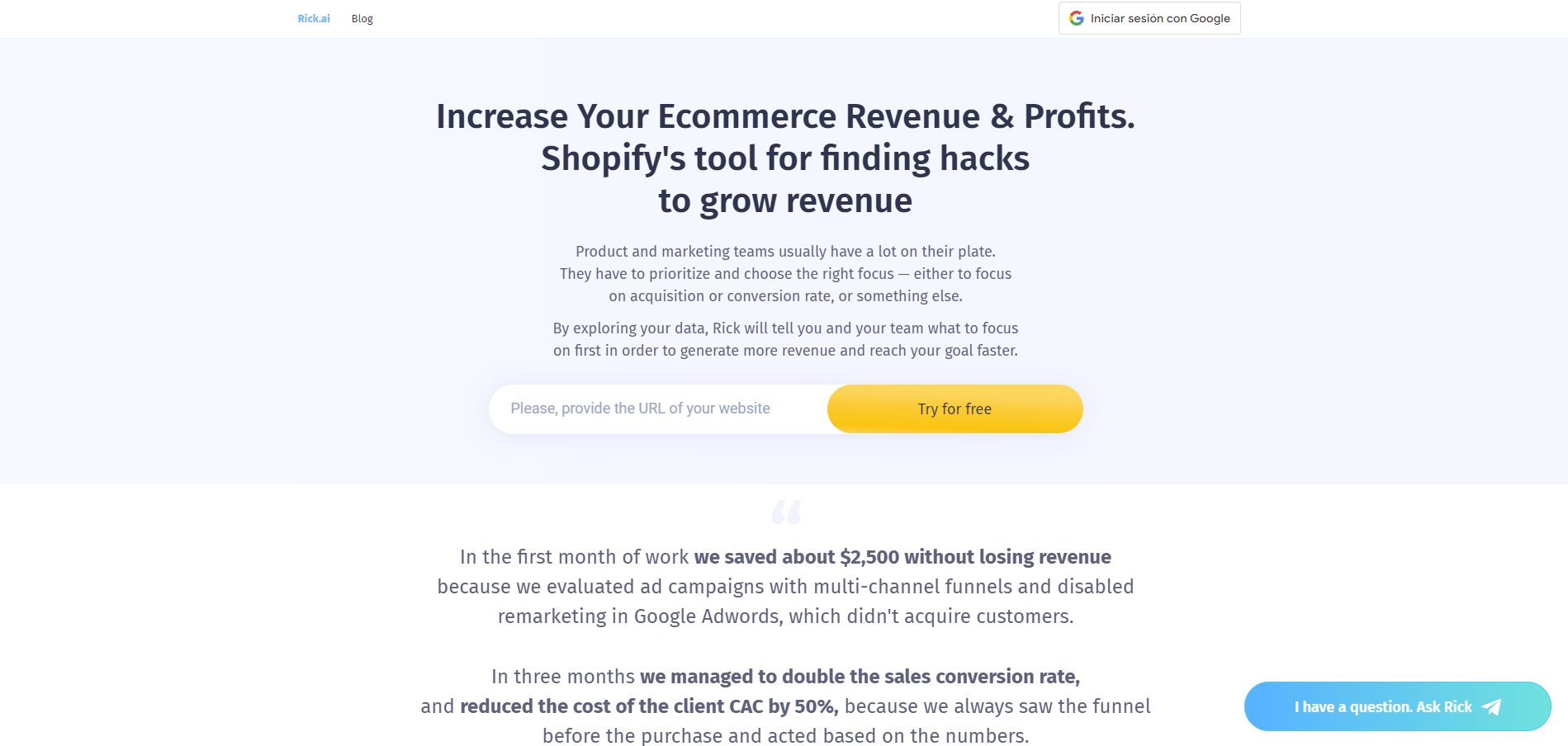
Description: a comprehensive solution tailored for Shopify retailers that provides accurate data about sales patterns, client behaviors, and efficiency of strategies, empowering you to make well-informed choices.
Characteristics:
- Elaborate Analysis. Enables comprehensive monitoring of your marketing efforts and sales through dashboards and extensive reports, highlighting the most effective channels, offers, and strategies, therefore boosting your marketing initiatives.
- Advanced Segmentation. Features robust instruments that classify clients based on such factors as demographics, previous actions, and activity patterns. This functionality is delivered in hours, significantly faster than typical analytics tools, which boosts your ability to customize marketing approaches for distinct customer groups.
- Personalized Dashboards. With Rick.ai, you can design custom dashboards, monitor essential metrics, and share them with your colleagues to align efforts and drive teamwork.
- Exclusive Algorithms. The platform employs proprietary algorithms that effectively address common tracking and attribution errors, providing a more accurate understanding of client journeys.
Benefits:
- Delivers predictive analytics and detailed data reporting.
- Directly designed for Shopify platforms.
- Supported by a dedicated “Care team” that’s ready to assist at every stage.
Drawbacks:
- Fewer integration capabilities than those offered by some established competitors.
- Less emphasis on visual representations and more on table-based analytics.
Pricing Model: flexible plans depending on the business size and requirements.
Target Audience: businesses seeking cutting-edge analytics tools, thorough insights, and robust support.
2. Google Analytics
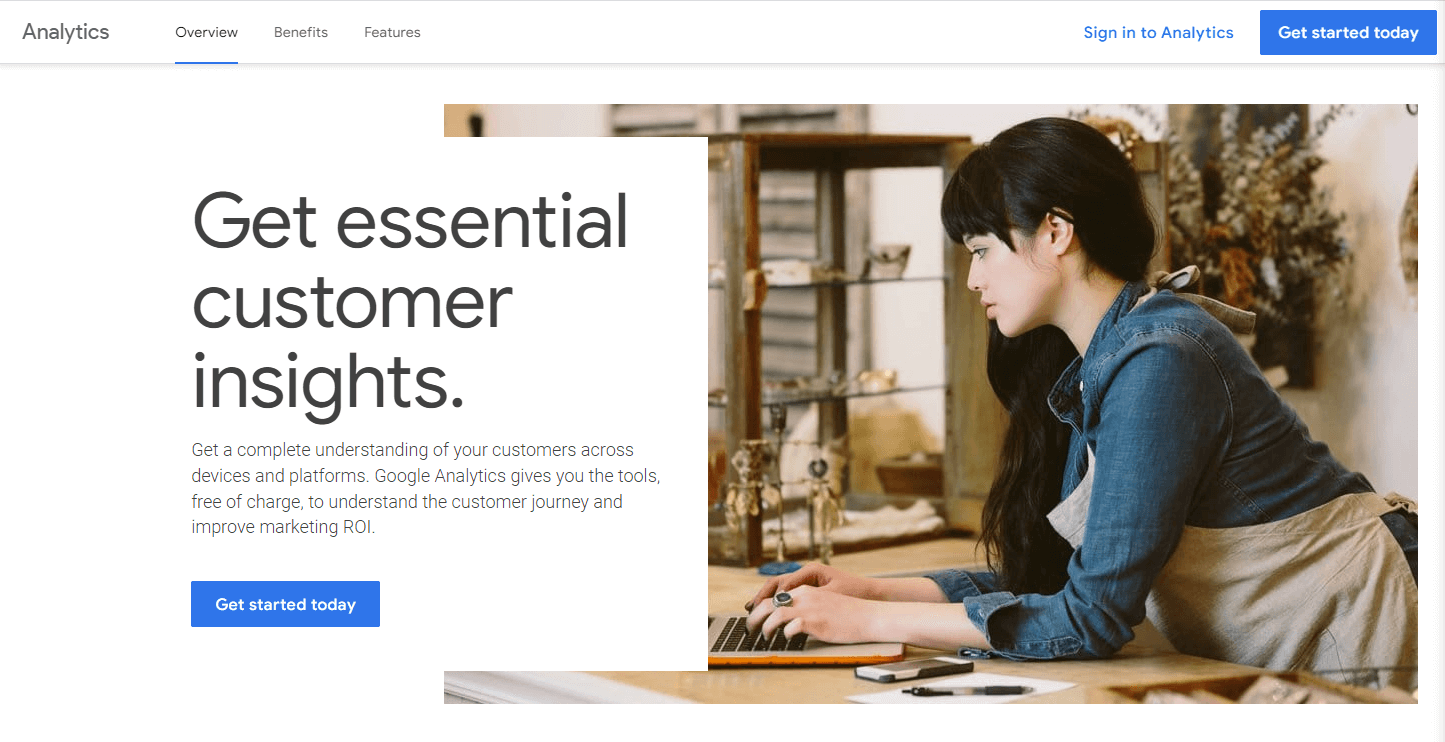
Description: an advanced tool that delivers extensive insights into traffic and user actions, and is particularly highly regarded among e-commerce platforms due to its advanced tracking features and ability to integrate seamlessly with other Google products (Google Search Console, Google Ads).
Characteristics:
- Seamless Integration. Integrates smoothly with Google services, enhancing your ability to view and analyze information from a number of different sources
- Traffic Insights. From customer location to devices they use and activities on your site, Google Analytics grants access to data on your visitors for a better understanding of their behavior and sources of traffic.
- Custom Reports. Customize dashboards and reports in Google Analytics: tailor them to meet specific needs and set them up to be sent directly to your email on a regular basis.
- E-commerce Monitoring. The platform includes advanced e-commerce monitoring capabilities to directly track sales, revenues, performance details, and conversion rates. This information is valuable to pinpoint more successful areas and identify sectors that need your attention.
Benefits:
- Seamless integration with other services by Google.
- Offers comprehensive reporting functionality.
- The standard version is available free of charge.
Drawbacks:
- Might prove complex for novice users.
- No direct practical advice based on the analysis results.
- A manual setup is needed for full e-commerce tracking.
Pricing Model: free (standard version); varied for Google Analytics 360 (provides extra capabilities, price varies depending on specific customer demands).
Target Audience: tech-savvy companies that require an extensive, cost-effective analytics platform.
3. Polar Analytics
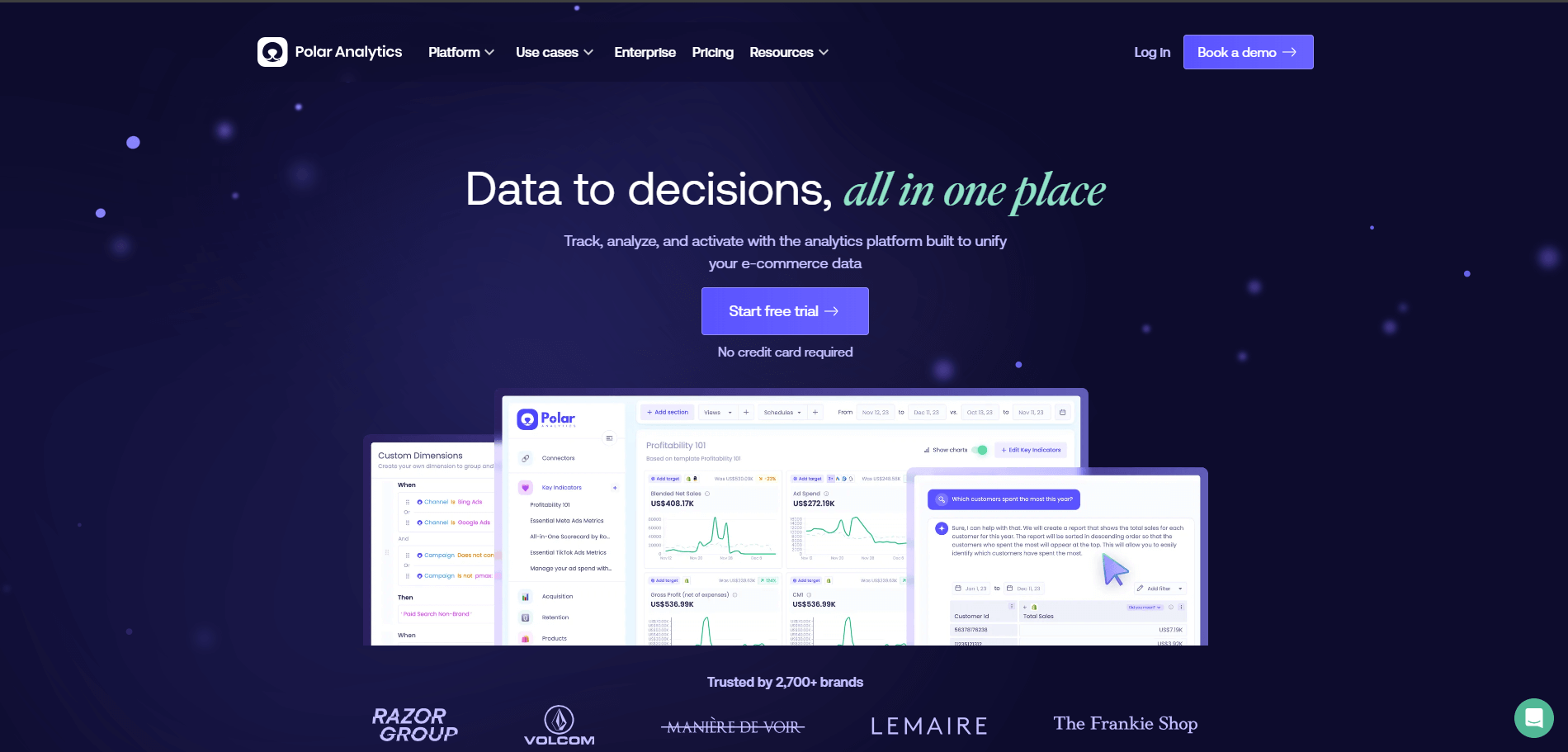
Description: an effective analytics platform that collects data from multiple different sources into a single location and equips e-commerce enterprises with in-depth insights for strategic decisions.
Characteristics:
- Intuitive Dashboard. Features a unified dashboard that aggregates data from a variety of sources (like Google Ads and Facebook Ads) and helps you analyze the received data faster and easier.
- Real-time Metrics. Gain access to immediate data about the performance of your store and swiftly adapt to emerging trends.
- Automated Notifications. Set up automatic notifications to alert you about considerable shifts in your metrics, always keeping you informed on critical developments.
- Tailored Reports. Users can tailor reports to their specific requirements, enabling meticulous tracking of key performance indicators.
Benefits:
- Intuitive interface with straightforward dashboards.
- Delivers real-time insights and automatic notifications.
- Integrates data from several channels.
Drawbacks:
- Higher costs for enhanced functionality.
- Limited graphical visualizations, primarily relies on table-based analytics.
Pricing Model: free version offers basic functionalities; paid plans begin at $119 / month and include enhanced features and greater data capacity.
Target Audience: e-commerce businesses seeking a robust tool to collect data from a number of channels, emphasizing tailored reporting and real-time updates.
Need an effective tool for your email templates?
Blocks, our no-code builder, is at your service!
4. Shopify Analytics
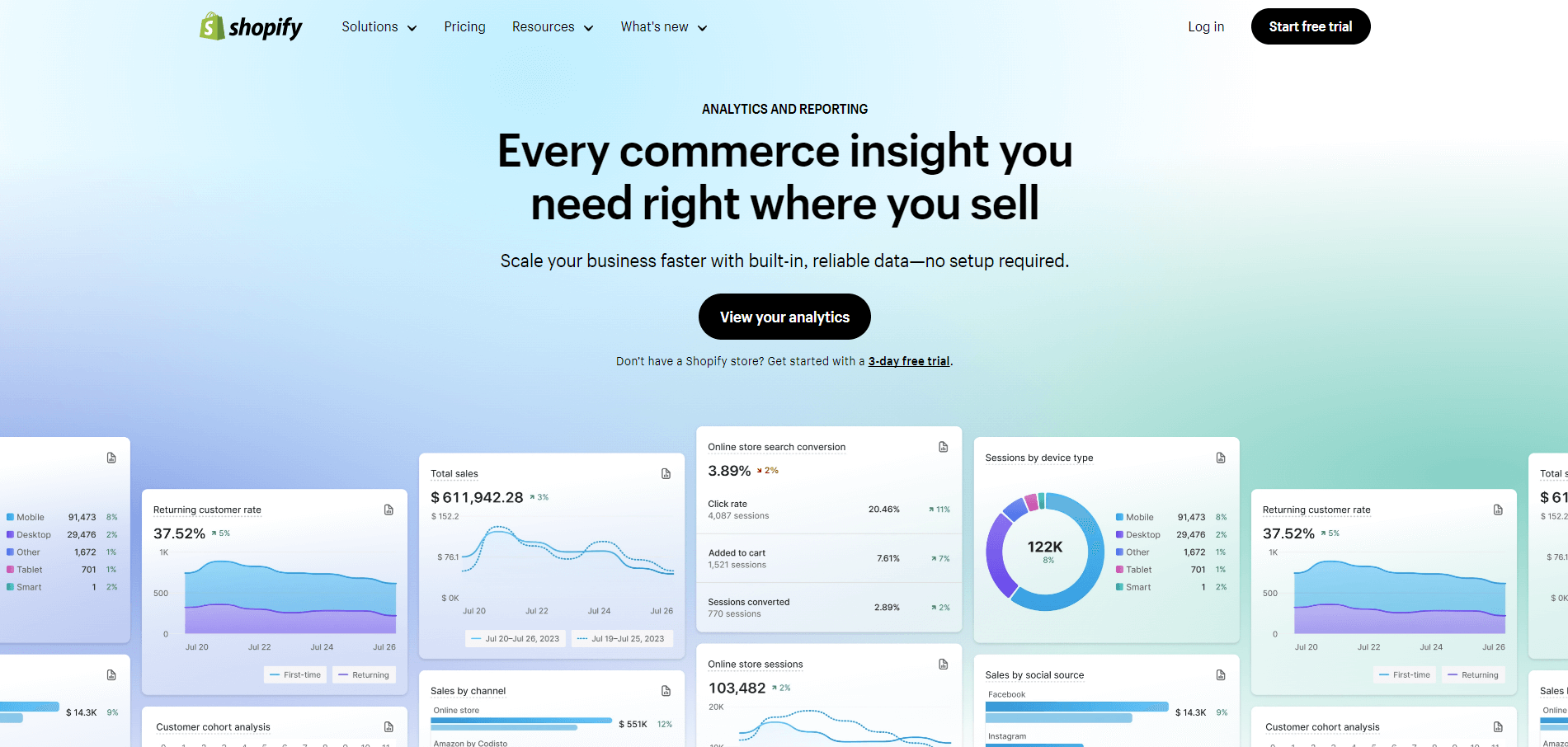
Description: an integral part of the Shopify platform that offers an array of tools to assist store owners in gauging their performance data, and offers valuable insights into traffic, client demographics, and sales figures.
Characteristics:
- Built-in Reports. Comes equipped with over 60 predefined reports and dashboards that cover various useful indicators essential for spotting tendencies and seizing prospects.
- Customer Insights. Provides deep, thorough analysis of customer demographics, buying patterns, and overall LTV, which helps amp up your marketing efforts.
- Analytics in Real Time. Enables you to track sales and visitor activity in real time (which is especially beneficial during promotional periods and special events) and allows for immediate adjustments based on live data.
- Financial Analysis. Monitor various financial indicators like sales, taxes, and payment processing to correctly evaluate financial situations and manage cash flows.
Benefits:
- Fully integrated within the Shopify ecosystem.
- Features real-time analytics.
- Designed with an intuitive interface for e-commerce users.
Drawbacks:
- More detailed reports are only accessible in the higher-tier subscription plans.
- Less customization when compared to dedicated analytics tools.
- Difficulties may arise in correlating sales data with specific campaigns or channels.
Pricing Model: provided as part of all Shopify plans ($39 to $399 / month); the depth and customization level of the reports depend on the price plan.
Target Audience: Shopify store owners who need a streamlined, integrated solution.
5. Triple Whale
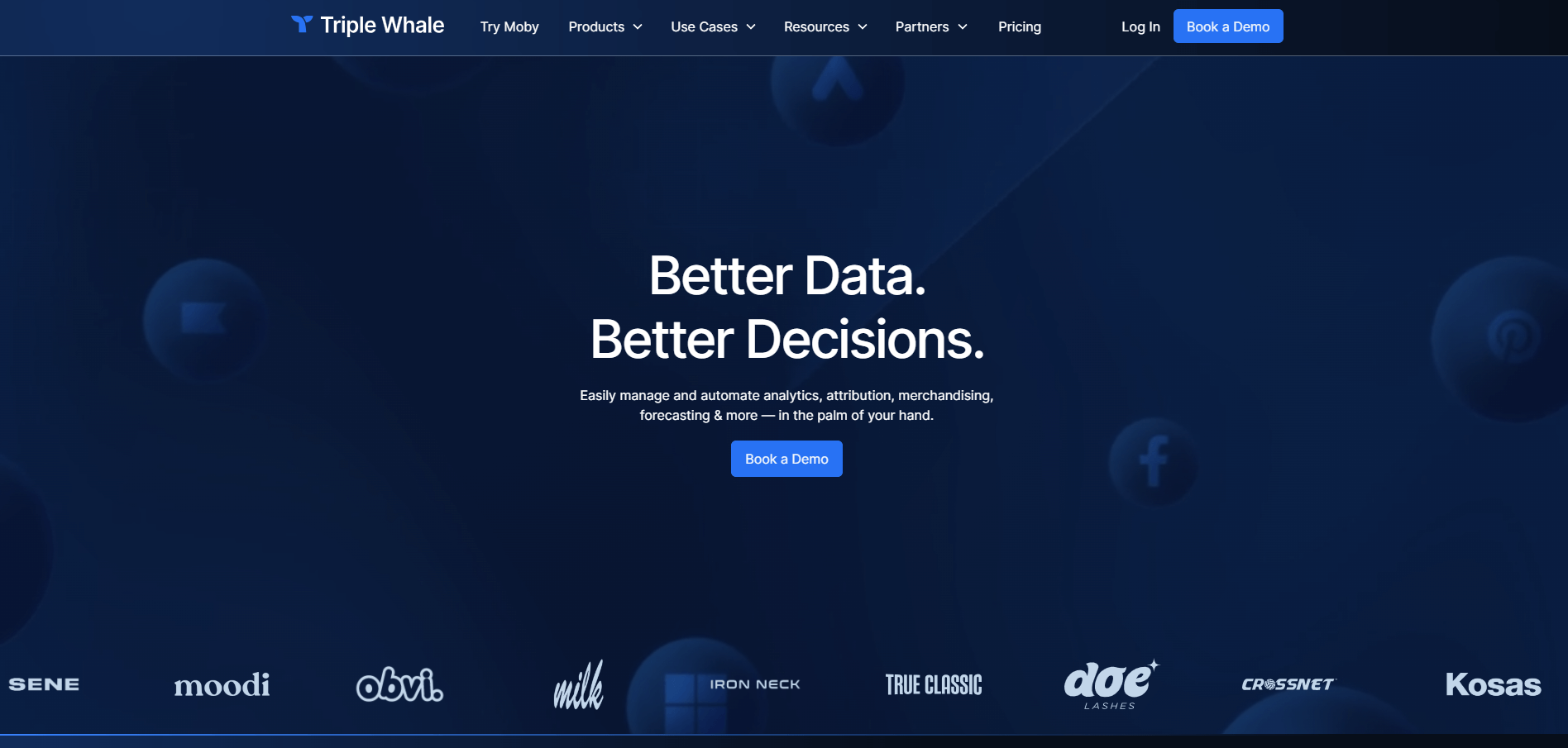
Description: an analytics tool tailor-made for e-commerce operations that integrates data from a number of different sources into a single dashboard, making it easier to analyze the store’s performance comprehensively.
Characteristics:
- Conversion Measurement. Offers precise tracking of conversions to pinpoint the most effective channels. This critical data aids in the smarter allocation of your marketing resources.
- Unified Dashboard. Provides a cohesive data display by including information from different platforms (Google Ads, Facebook, etc.) to streamline data analysis and support well-informed decision-making.
- Customer Journey Monitoring. Track your customers’ interactions across various touchpoints (from the first contact to the purchase) to gain useful data, enhance your marketing tactics, and boost conversions.
- Tailored Reports. Tailor reports to focus on the key metrics that are relevant to your enterprise and set up automated report delivery to your email, ensuring the data you receive is always up-to-date.
Benefits:
- Features an easy-to-use adaptable interface.
- Offers a centralized overview of all marketing and sales data.
- Efficient in monitoring performance across a variety of channels.
Drawbacks:
- More expensive than other options.
- Steep learning curve to effectively harness the platform features.
Pricing Model: includes a free version; paid plans begin at $129 / month, costs depend on the range of functions and the volume of data handled.
Target Audience: businesses requiring a centralized analytics solution with in-depth multi-channel tracking and tailored reports.
Conclusion
Whether you select Rick.ai for its insights, Shopify Analytics for its direct integration with the Shopify ecosystem, or any other potent platform, remember: the crucial factor is utilizing data-driven decisions to advance your store towards triumph and profit. Prioritize tools that offer precise data, customization, and dependable support to ensure the solution of your choice matches your business requirements and aids in achieving your objectives.
Need an effective tool for your email templates?
Blocks, our no-code builder, is at your service!
